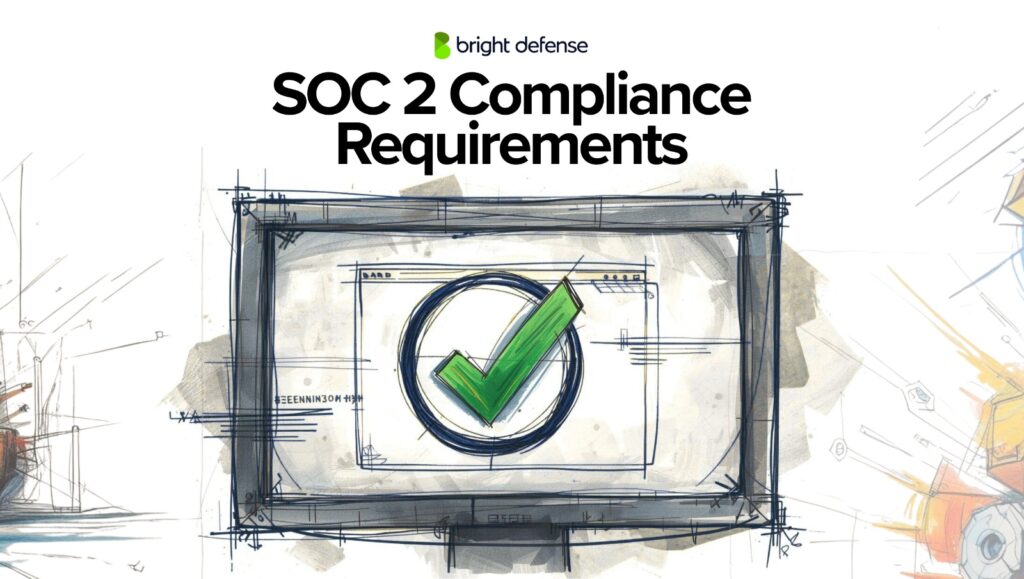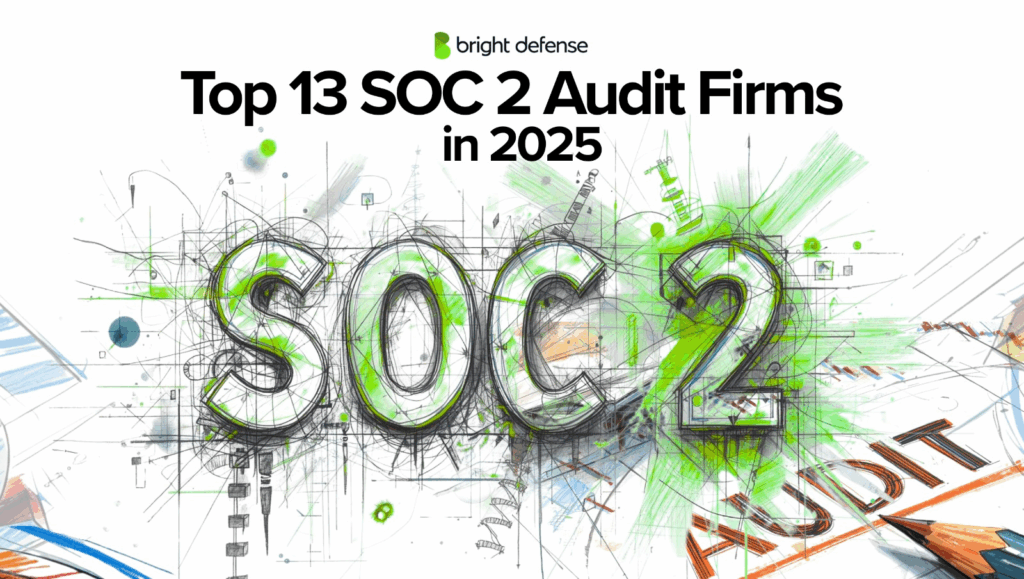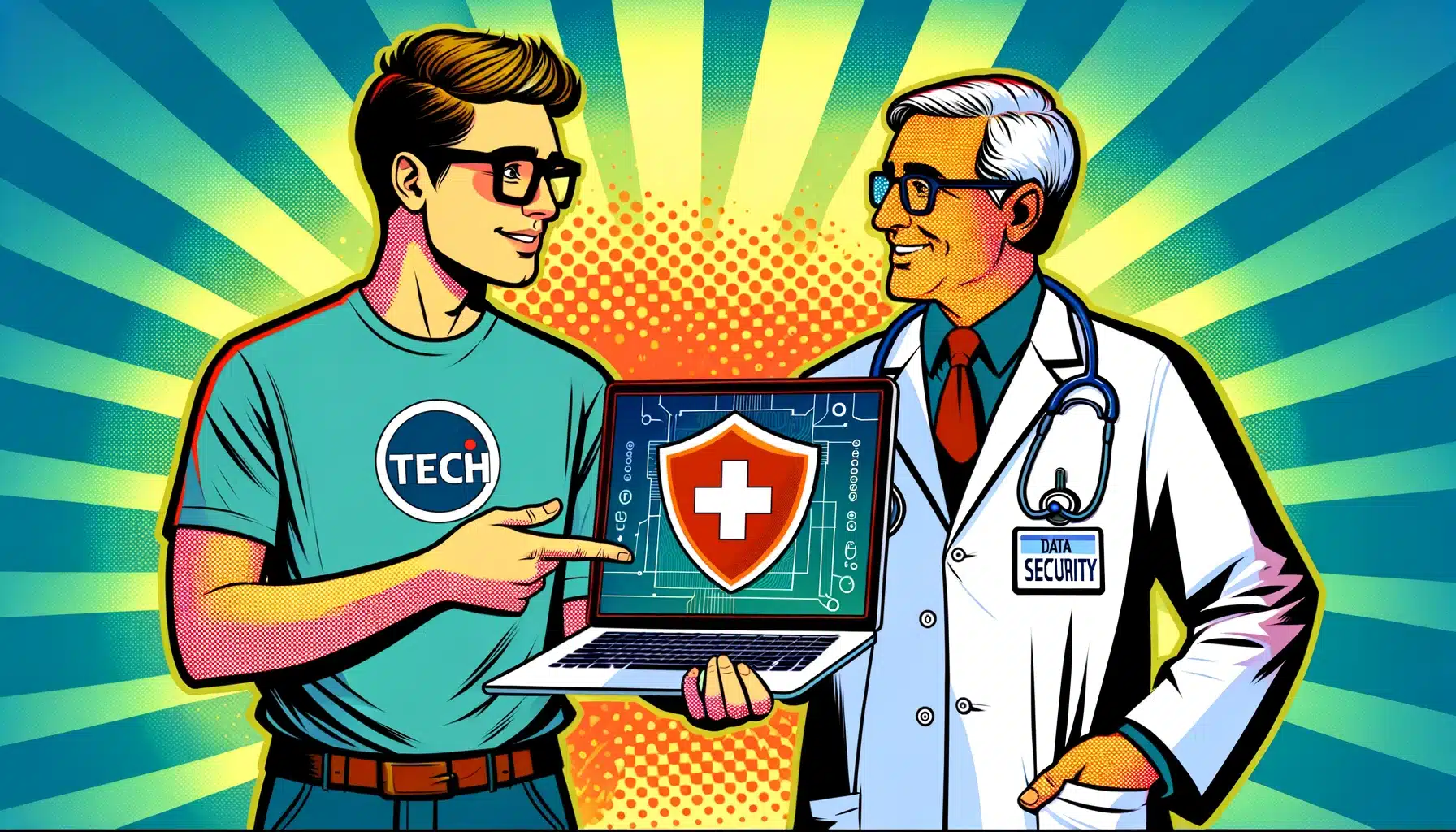
HIPAA Compliance Automation: A Case Study for HealthTech Companies
The Health Insurance Portability and Accountability Act (HIPAA) is a critical benchmark for protecting patient data in the ever-evolving healthcare landscape. As compliance requirements become more stringent, healthcare providers are turning towards automation as a viable solution to meet these demands. This article delves into the world of HIPAA compliance automation. We’ll guide you through the benefits of HIPAA compliance automation and provide helpful tips for implementing the right automation tool.
Dive Into HIPAA Compliance
At its core, HIPAA aims to safeguard sensitive patient information. This data is typically referred to as Protected Health Information or PHI. HIPAA affects many entities within the healthcare industry, from healthcare providers to SaaS providers. HIPAA violations can incur steep fines with a maximum annual cap of $1,500,000. As of January 2024, the US Department of Health and Human Services, which enforces HIPAA policies, has assessed over $142 million in fines.
HIPAA encompasses several critical rules: Privacy, Security, and Breach Notification. Each has its own set of standards for handling and protecting patient data. Despite the clear guidelines, many healthcare organizations need help maintaining compliance. This is often due to healthcare data management’s complex and dynamic nature. Compliance automation helps bridge this gap.
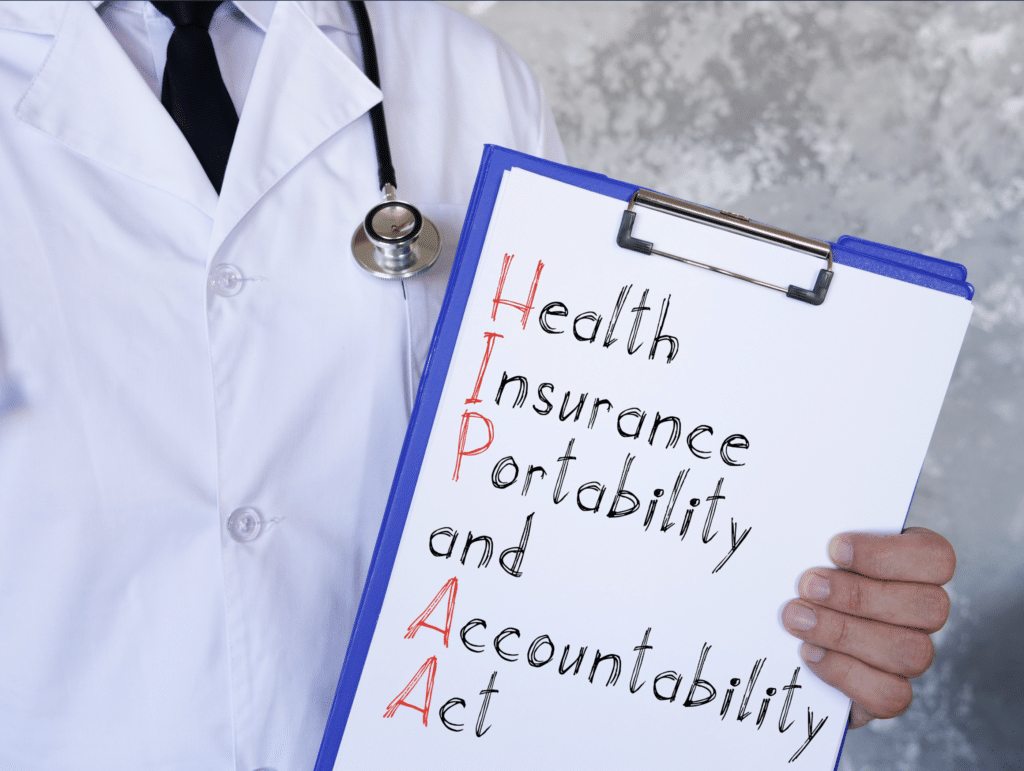
The Automation Advantage
Automation introduces a transformative approach to HIPAA compliance. By leveraging technology, healthcare organizations can enhance efficiency, improve accuracy, and reduce costs associated with compliance efforts. From encrypting patient data to managing access controls and maintaining detailed audit logs, automation streamlines these critical tasks. This makes compliance a more manageable part of daily operations.
Implementing Automation in Steps
Embarking on the automation journey involves a structured approach:
- Assess Your Needs: Identify which aspects of HIPAA compliance pose the greatest challenges and opportunities for automation.
- Select the Right Tools: Explore technologies and tools designed for compliance automation, focusing on those that offer encryption, secure data storage, and automated risk assessments.
- Adopt Best Practices: Ensure the successful implementation of automation
- solutions by following best practices, including thorough planning, testing, and staff training.
Bright Defense: Transforming HIPAA Compliance for HealthTech Innovation
In the dynamic landscape of HealthTech, maintaining stringent HIPAA compliance while fostering innovation presents a unique challenge for SaaS-based companies. Bright Defense recently undertook a transformative project with a HealthTech company, which develops a SaaS-based CRM and business automation platform for dental practices. Within three months, we revamped their approach to HIPAA Privacy and Security controls. We leveraged an integrated suite of technologies including Drata, AWS, Microsoft Intune, Google Workspaces, Gusto, and Checkr.
The Challenge: Navigating the Complexities of HIPAA Compliance
The HealthTech company faced significant hurdles in implementing robust HIPAA Privacy and Security controls. The primary challenges included managing complex regulatory requirements, ensuring continuous compliance amidst rapid technological advancements, and integrating various operational tools without compromising on security or efficiency.
Bright Defense’s Strategy: A Tailored Compliance Framework
Bright Defense embarked on a strategic partnership with the HealthTech company, focusing on three critical areas: comprehensive risk assessment, streamlined compliance processes, and continuous monitoring. The plan was ambitious – to achieve full HIPAA compliance within three months. This was a challenging goal considering the project’s complexity.
Implementing Drata: The Compliance Journey Tracker
Central to this transformation was the implementation of Drata, a cutting-edge platform that automates compliance monitoring and evidence collection. Drata’s integration allowed for real-time tracking of compliance milestones. This provided Bright Defense and the HealthTech firm with continuous insights into their HIPAA compliance status.

Leveraging AWS and Microsoft Intune for Secure Infrastructure
AWS served as the backbone for secure data storage and processing, ensuring the team handled all patient information in compliance with HIPAA’s stringent security standards. Meanwhile, the team leveraged Microsoft Intune’s Mobile Device Management (MDM) capabilities to secure and manage company devices, tightly controlling and monitoring access to sensitive data.
Streamlining Operations with Google Workspaces and Gusto
The HealthTech firm used Google Workspaces for email, file sharing and collaboration and as their Identity Provider (iDP), offering a seamless and secure way to manage user identities and access across HealthTech Innovations Inc.’s operations. Gusto’s HRIS platform streamlined human resources processes, ensuring that all employee data management complied with HIPAA requirements.
Enhancing Security Checks with Checkr
Recognizing the importance of thorough background checks in maintaining a trustworthy team, Bright Defense integrated Checkr into the hiring process. This ensured that all new hires underwent comprehensive background checks. Check aligned with HIPAA’s workforce clearance procedures, bolstering the company’s commitment to privacy and security.
The Outcome: A Transformative Three Months
Within three months, the HealthTech firm not only achieved full HIPAA compliance but also established a robust framework for continuous compliance monitoring and improvement. This rapid transformation was marked by several key achievements:
- Streamlined Compliance Processes: Automated workflows and centralized monitoring significantly reduced the administrative burden of compliance.
- Enhanced Data Security: The integration of AWS and Microsoft Intune provided a secure, compliant infrastructure for handling sensitive health information.
- Operational Efficiency: Google Workspaces and Gusto streamlined operations while ensuring compliance, improving overall productivity.
- Trusted Workforce: Checkr’s background checks reinforced a culture of trust and compliance within the team.
Conclusion: Setting a New Standard in HealthTech Compliance
Bright Defense’s success with this HealthTech firm has set a new standard for achieving HIPAA compliance in the Healthcare sector. By leveraging innovative technologies and a strategic approach, they transformed a daunting compliance challenge into an opportunity for growth and innovation. This success story serves as a testament to the power of partnership and technology in navigating the complexities of healthcare compliance, paving the way for a future where HealthTech companies can thrive without being hindered by regulatory challenges.
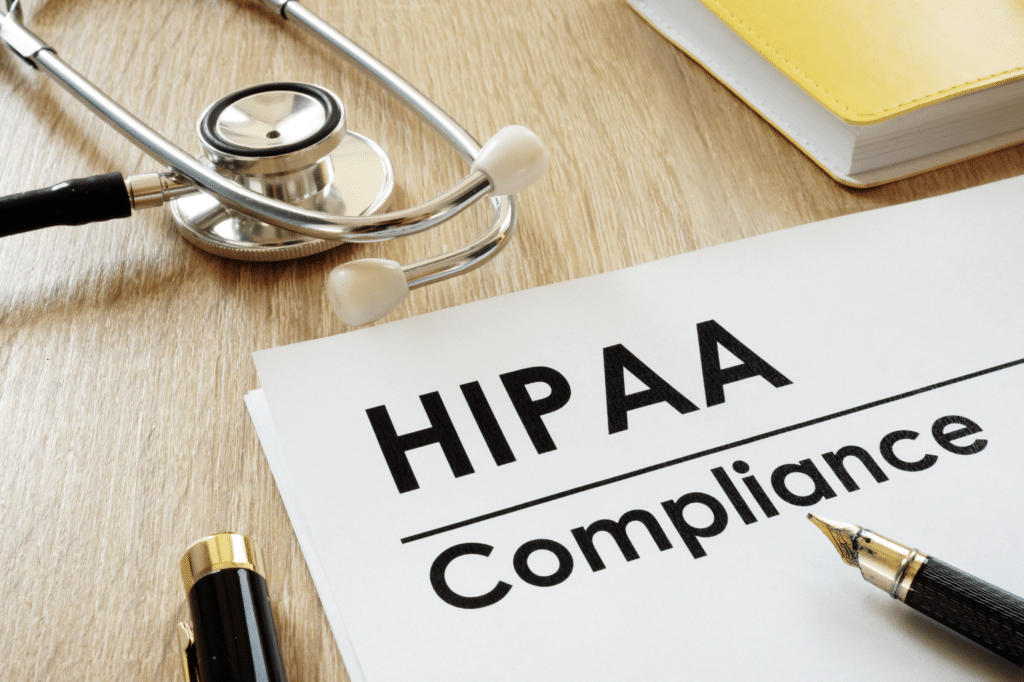
Overcoming Automation Challenges
While the move towards automation comes with its set of challenges, such as initial setup costs and the need for continuous staff training, these hurdles can be navigated with careful planning and execution. Staying informed about regulatory changes and conducting regular audits will further ensure that automated systems remain compliant and effective.
Looking Ahead: The Future of Compliance Automation
The trajectory of HIPAA compliance automation is set for rapid evolution, with emerging technologies like artificial intelligence and blockchain offering new avenues for enhancing data security and compliance processes. As these technologies mature, they promise to further revolutionize how healthcare providers manage and protect patient information.
Conclusion
Automating HIPAA compliance is not just about keeping up with regulatory requirements; it’s about redefining how healthcare organizations operate, ensuring patient data is protected through the most efficient and effective means. By embracing automation, healthcare organizations can improve compliance and allocate more resources toward patient care and innovation. The time to start planning your HIPAA compliance automation strategy is now.
As the healthcare landscape changes, staying proactive in compliance efforts will ensure that healthcare providers can focus on what matters most – delivering quality patient care. Automation in HIPAA compliance is not just a trend; it’s the future.
Automate HIPAA Compliance with Bright Defense!
If you are a healthcare organization that’s interested in automating compliance, Bright Defense can help. Our monthly engagement model builds a security program to meet HIPAA and other relevant frameworks. If you have already achieved HIPAA compliance, we can help you maintain compliance and simplify the compliance process through automation and expertise.
Bright Defense also offers other services to improve your security posture and protect PHI. These include vCISO services, vulnerability management, managed security awareness training, and mobile device management.
Reduce compliance costs and meet HIPAA standards with Bright Defense. Get started today!
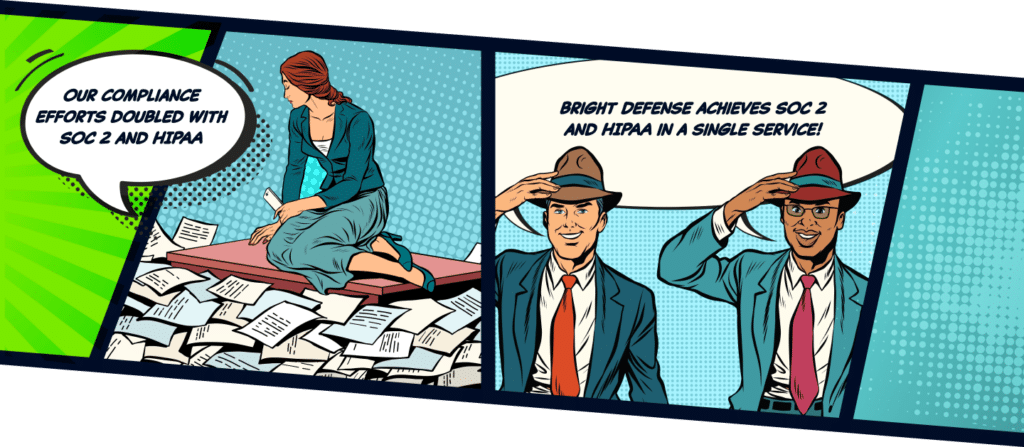
FAQ: HIPAA Compliance Automation
What is HIPAA compliance automation?
HIPAA compliance automation refers to the use of software tools and technologies designed to help healthcare organizations, covered entities, and business associates maintain compliance with the Health Insurance Portability and Accountability Act (HIPAA) regulations. These tools automate various compliance tasks. These include risk assessments, continuous compliance monitoring, and employee training to protect Protected Health Information (PHI) more efficiently.
How does automation help in maintaining compliance with HIPAA?
Automation helps maintain compliance with HIPAA by reducing manual work, which is often time-consuming and prone to errors. Automated monitoring and security policies ensure continuous compliance and identify potential risks in real-time. This enables healthcare organizations to address issues before they lead to HIPAA violations.
What are the key features of HIPAA compliance automation software?
Key features typically include continuous compliance monitoring, automated risk assessments, employee training modules, audit preparation tools, and automatic updates to security policies based on the latest HIPAA regulations. This software is designed to protect sensitive data by identifying vulnerabilities and ensuring that healthcare organizations comply with all HIPAA requirements.
Can automation prevent HIPAA violations?
Yes, automation can significantly reduce the risk of HIPAA violations by continuously monitoring for potential risks, ensuring that security policies are up-to-date, and providing employees with ongoing training. By identifying and addressing compliance issues promptly, automation helps protect PHI and avoid costly penalties associated with HIPAA violations.
Is automation sufficient for HIPAA compliance?
While automation greatly enhances an organization’s ability to comply with HIPAA, it should not be the sole strategy. Successful HIPAA compliance also requires a commitment from all levels of the organization to follow security policies, protect sensitive data, and stay informed about HIPAA regulations. Automation should complement, not replace, these efforts.
How does automated monitoring work?
Automated monitoring works by continuously scanning the healthcare organization’s systems and processes for any activity that might indicate a risk to PHI security. It alerts the organization to potential threats and can often remediate issues automatically, depending on the severity and nature of the risk.
What are the benefits of HIPAA compliance automation for auditors?
For auditors, HIPAA compliance automation offers streamlined and efficient methods to assess an organization’s compliance. Automated reports, logs, and risk assessments provide auditors with the necessary documentation to verify compliance, save time during audits, and reduce the burden on healthcare organizations during the audit process.
Can automation help with employee training?
Yes, many HIPAA compliance automation platforms include modules for employee training. These modules can be automatically updated to reflect the latest HIPAA regulations and best practices, ensuring that employees are always informed about how to protect PHI and comply with HIPAA.
How do healthcare organizations start with HIPAA compliance automation?
Healthcare organizations can start by assessing their current compliance processes to identify areas where automation could have the greatest impact. Consulting with HIPAA compliance experts or software vendors can help organizations choose the right tools to meet their specific needs, ensuring a smooth transition to a more automated compliance process.
Are there any drawbacks to HIPAA compliance automation?
While the benefits of automation are significant, healthcare organizations should be aware of potential drawbacks, such as the initial cost of software and the need for employee training on the new system. However, the long-term savings in time and reduction in risk often outweigh these initial challenges.
Get In Touch


